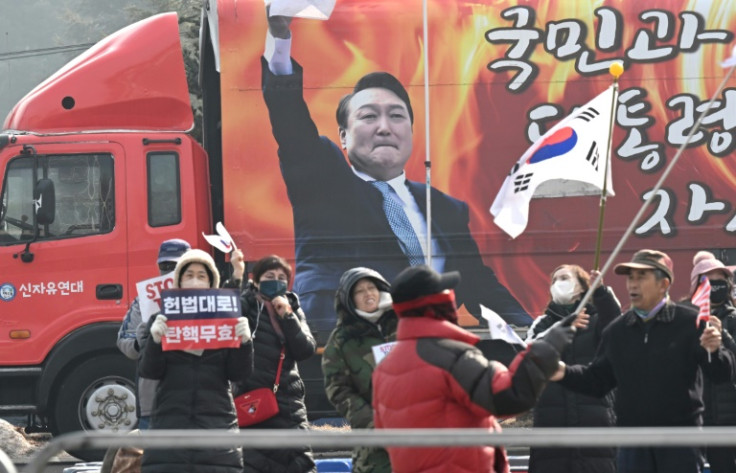S. Korea Investigators Recommend Yoon Be Charged With Insurrection, Abuse Of Power

South Korean investigators recommended Thursday that impeached President Yoon Suk Yeol be charged with insurrection and abuse of power, as they handed prosecutors the results of their probe into his ill-fated declaration of martial law.
Yoon should be charged with "leading an insurrection and abuse of power", the Corruption Investigation Office said after a 51-day probe into his December 3 attempt to suspend civilian rule.
The CIO said it had asked Seoul prosecutors to "file charges against the sitting President, Yoon Suk Yeol" accusing him of conspiring with his former defence minister and other military commanders to "disrupt the constitutional order."
The leader, currently suspended from duties, "declared martial law with the intent to exclude state authority or disrupt the constitutional order, thereby inciting riots".
Under the South Korean legal system, his case file -- identified as "Yoon Suk Yeol: president" -- will now be handed to prosecutors, who have 11 days to decide whether to charge him, which would lead to a criminal trial.
Yoon was arrested in a dawn raid last week on insurrection charges, becoming the first sitting South Korean head of state to be detained in a criminal probe.
South Korea was plunged into political chaos by his botched martial law declaration, which lasted just six hours before lawmakers voted it down. They later impeached him, stripping him of his duties.
Since his arrest, Yoon -- who remains head of state -- has refused to be questioned in the criminal probe and "consistently maintained an uncooperative stance," Lee Jae-seung, deputy CIO chief, told reporters.
Yoon's security detail also "obstructed searches and seizures, including access to secure communication devices like classified phones," Lee said.
As a result, investigators have decided it would be "more efficient" for prosecutors to handle the case.
Yoon's legal team said Thursday they urged prosecutors to "conduct an investigation that adheres to legal legitimacy and due process".
Yoon, currently held in a detention centre, appeared in court Thursday for another hearing at the Constitutional Court, which will decide whether to uphold his impeachment and strip him formally of the presidency.
He argued that he didn't believe the short-lived martial law was a "failed martial law", but rather one that "ended a bit sooner" than he expected.
Former defence minister Kim Yong-hyun -- who resigned after the martial law bid -- also appeared in court.
He told judges Yoon had declared martial law only very reluctantly, according to court pool reporters.
Yoon himself questioned the ex-defence minister, asking him about the draft of the martial law declaration.
"As far as I recall, on the night of December 1 or 2, you brought the proclamation to the residence," said Yoon, adding that in reviewing the draft declaration, he saw many legal flaws.
Yoon then asked Kim if he remembers the situtation "where we laughed as I said, let's just leave it as it is since it (the martial law) is not feasible".
Kim answered that he remembered that day and felt the president "wasn't as meticulous as usual".
If the court rules against Yoon, he will lose the presidency and elections will be called within 60 days.
During the night of December 3, Yoon purportedly ordered troops to storm the National Assembly and prevent lawmakers from voting down his declaration of martial law.
The CIO said its probe found that Yoon "abused his authority by compelling police officers from the National Assembly Guard Unit and martial law forces to perform duties beyond their obligations".
He also "obstructed the exercise of lawmakers' rights to demand the lifting of martial law", it added.
At a hearing earlier this week, Yoon denied instructing top military commanders to "drag out" lawmakers from parliament to prevent them from voting down his decree.
© Copyright AFP 2025. All rights reserved.





















